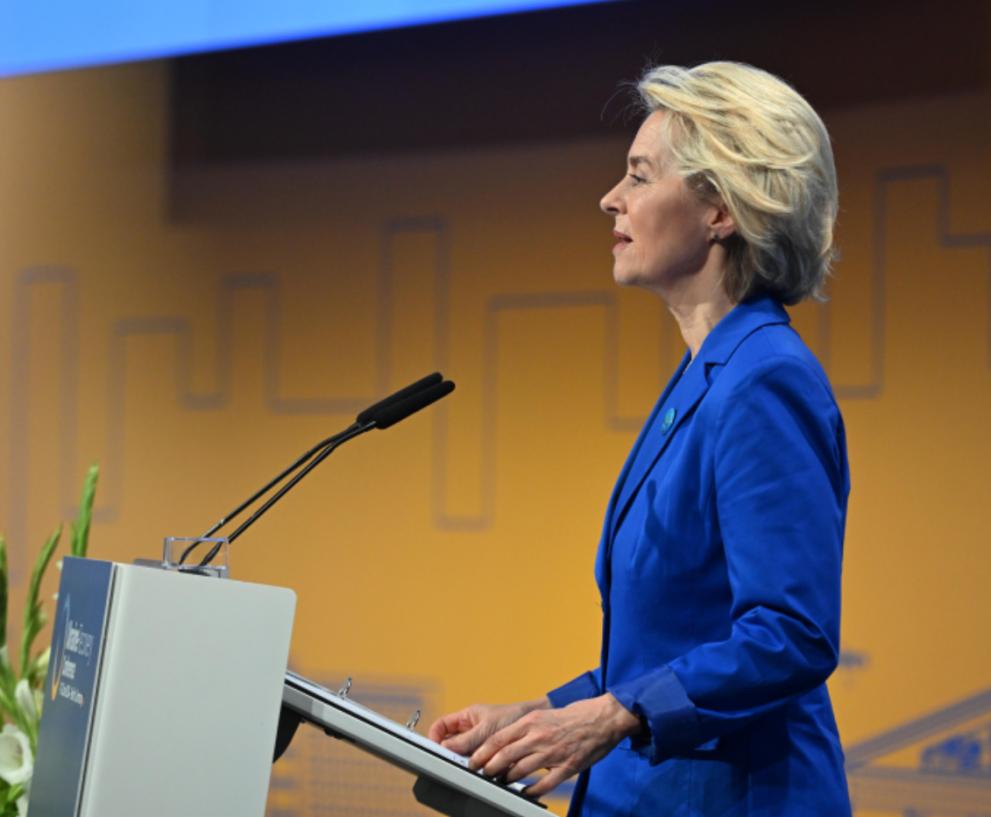
"Check against delivery"
Chancellor Scholz,
President Zelenskyy,
First Lady, dearest Olena,
Presidents,
Prime Ministers,
Ministers,
Excellencies,
Ladies and Gentlemen,
It has been almost 900 days since Russia's full-scale invasion began. But the stakes are just as clear as on day one. We know what the two sides in this conflict stand for. Russia fights to end Ukraine. Ukraine fights to end the war. Russia fights for the past. Ukraine fights for a better future. Russia destroys. Ukraine defends. In no place is this contrast starker than in the embattled city of Kharkiv. Two years ago, the people of Kharkiv pushed back Russia's aggression. And since then, they have not only rebuilt; they have opened new cultural centres; they have drafted plans for a greener city, a city that thrives on traditional industries as well as innovative start-ups. But Russian bombs are now raining again from the sky, targeting apartment buildings and shopping centres. Putin wants to crush the city and its love for life and liberty. So Kharkiv and Ukraine need all our support. And this is what brings us here to Berlin. Putin must fail. Ukraine must prevail. And we must help Ukraine to rise from the ashes and be master of its own future.
This means, first and foremost, that we must provide Ukraine with the means to defend itself. At last years' Recovery Conference, I said we should transfer to Ukraine the proceeds of immobilised Russian assets. And now we are making it happen, in line with international law, and while ensuring the stability of financial markets. Around EUR 1.5 billion from the windfall profits will become available in July: 90% of these funds will go to defence, 10% to reconstruction. And later this week, at the G7 Summit, we will further discuss how Ukraine can benefit even quicker from the proceeds of the immobilised Russian assets. We have always said that Russia must be held accountable for its crimes. And now, we are making Russia pay.
Ladies and Gentlemen,
The rationale of this conference has always been to look beyond Ukraine's immediate needs and chart a credible path towards its economic renaissance. In London last year, I presented the new EUR 50 billion Facility for Ukraine, to provide predictable support until 2027. And Member States supported, also thanks to your tireless personal effort, Olaf. The Facility is backed by a solid plan for reforms and investments. It is now up and running. EUR 6 billion have already reached Ukraine. And here in Berlin, we are signing the first agreements worth EUR 1.4 billion with our partner banks, to attract investments in Ukraine from the private sector. And, as you have already mentioned, Olaf, we will also launch dedicated support for equity investments in Ukraine. Our partner banks will be able to apply for EU budget support, when they invest in equity funds active in Ukraine. In that way, we, the EU, help them remove some of the risks associated with equity investments. Our aim is to improve access to finance for Ukrainian businesses, especially for SMEs and start-ups that can help modernise the Ukrainian economy, for example, in areas like IT and digitalisation, renewable energy, and critical raw materials. We will start with a pilot to address the most urgent needs, which can be scaled up over time. I know the business community wants to step up its contribution. And together, we will mobilise the financial firepower to help Ukraine resist and recover.
This includes of course also continued material support, in view of Russia's systematic attacks on Ukraine's energy grid. We have raised close to EUR 500 million so far, for urgent repairs. In addition, we are providing 1,000 more generators for urgent power generation. And thousands of solar panels are about to arrive in Ukraine. The aim is to help decentralise the power system and thus increase resilience.
Today, I can also announce that we will deliver to Ukraine an additional EUR 1.9 billion from our Ukraine Facility by the end of this month. This is because of the comprehensive reforms and investment strategy that Ukraine has approved. It is called the Ukraine Plan. The Ukraine Plan includes, for instance, justice sector and anti-corruption reforms. This forms the basis of making Ukraine attractive for business and investors. And it is also bringing Ukraine closer to our European Union. Ukraine has fulfilled all the steps that we had set out. And this is why we believe the EU should begin accession talks with Ukraine already by the end of this month.
President Zelenskyy, dear Volodymyr,
This is the first Ukraine Recovery Conference that is held inside the European Union. And this is where your country belongs. Kharkiv is Europe. Ukraine is Europe. And our Union is your home.
Slava Ukraini. And long live Europe.
Details
- Publication date
- 11 June 2024
- Author
- Directorate-General for Neighbourhood and Enlargement Negotiations
